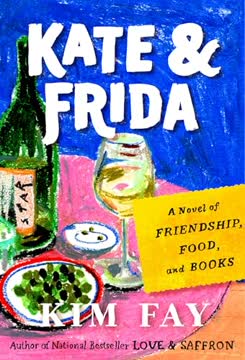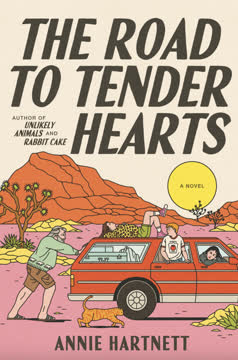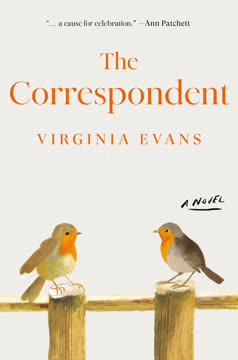Plot Summary
Letters Across Continents
In 1991, Frida Rodriguez, a young, ambitious Mexican-American writer, sends a letter from Paris to a Seattle bookstore, seeking a rare book. Kate Fair, a perky, earnest bookseller, responds. Their correspondence quickly becomes a lifeline, as they share their dreams, anxieties, and the minutiae of their daily lives. Through these letters, a deep friendship blossoms, bridging the distance between Paris and Seattle, and setting the stage for a story about connection, self-discovery, and the power of words.
Bookstore Beginnings
Kate's life revolves around the Puget Sound Book Company, a haven of books and quirky coworkers. She finds meaning in helping customers, recommending books, and navigating the literary snobbery of her colleagues. The bookstore is more than a job; it's a place where Kate's identity as a reader and aspiring writer is nurtured. Her letters to Frida are filled with vivid descriptions of Seattle, her family, and her struggles to find her voice as a writer.
Dreams and Disappointments
Both women wrestle with the gap between their dreams and the realities they face. Frida, inspired by war correspondents, yearns to write something meaningful, but is haunted by self-doubt and familial expectations. Kate, after a failed attempt at publishing her novel, questions her talent and place in the literary world. Their letters become confessions, as they share failures, insecurities, and the pressure to live up to others' ideals.
Parisian Wanderings
Frida's life in Paris is a whirlwind of bookstores, food adventures, and late-night walks. She befriends Kirby, an architecture student, and together they explore the city's culinary and cultural delights. Paris becomes a character in itself, shaping Frida's worldview and fueling her desire to do something of consequence. Yet, beneath the surface, she grapples with loneliness and the fear of not measuring up.
Friendship by Post
The correspondence between Kate and Frida grows more intimate, moving beyond small talk to raw honesty. They share family histories, childhood embarrassments, and the pain of not fitting in. Their letters become a safe space to process anxiety, heartbreak, and the search for purpose. Through their words, they encourage each other to keep writing, keep dreaming, and keep moving forward.
Journeys of Self-Doubt
Both women confront their inner critics. Kate's anxiety manifests as physical symptoms, and she feels out of place among her more worldly coworkers. Frida, despite her boldness, is plagued by doubts about her worth and her ability to make a difference. They each struggle to reconcile their tender hearts with a world that often rewards cynicism and detachment.
War Correspondent Aspirations
Inspired by the women journalists she admires, Frida secures a chance to report from Sarajevo during the Bosnian War. The reality of war is far more harrowing than she imagined. She witnesses the destruction, fear, and resilience of the city's people, and is forced to confront the limits of her own courage and the inadequacy of words in the face of atrocity.
Sarajevo's Burning Library
In Sarajevo, Frida is present when the city's national library is bombed and burned, a symbolic act of cultural genocide. She helps save books from the flames, meets students determined to preserve their heritage, and befriends Lejla and Irena, two women whose friendship defies ethnic divisions. The experience shatters Frida's innocence and forces her to question the role of a writer in a world on fire.
The Tender Heart's Test
Frida is overwhelmed by the suffering she witnesses and her inability to change the world. She is told by a seasoned journalist that not everyone is built for war reporting, and that there is no shame in walking away. Frida returns to Paris, changed and haunted, struggling with guilt and the challenge of finding meaning in small acts of kindness.
Food, Memory, and Identity
Both women discover that food is a powerful connector—to family, to culture, and to self. Frida cooks Bosnian dishes for refugees in Paris, creating moments of comfort and community. Kate, meanwhile, finds solace in family recipes and the rituals of cooking. They realize that food, like books, can carry memories and help reconstruct identity in times of upheaval.
Love, Loss, and Letting Go
Kate falls in love with Sven, a brilliant but troubled coworker, while Frida's relationships with Kirby and Niko are tested by distance and the traumas of war. Both women experience heartbreak and the pain of outgrowing people they once loved. Through these losses, they learn to value their own needs and to let go of relationships that no longer nourish them.
The Ramona Club Grows
Frida forms the Ramona Club, a group of refugees and friends who gather to share meals and read children's books. The club becomes a sanctuary for those displaced by war, and a testament to the healing power of small, joyful acts. Kate, inspired by Frida, organizes fundraisers and book drives, discovering her own capacity to make a difference.
Family, Forgiveness, and Growth
Both women confront unresolved issues with their families. Frida apologizes to her mother for dismissing her work as a food writer, and learns about the quiet power of telling everyday stories. Kate, after the death of her beloved grandfather Bumpa, finally opens up to her mother about her feelings, leading to a deeper, more honest relationship. They realize that understanding and forgiveness are essential to moving forward.
The End of Innocence
The deaths, disappointments, and traumas the women experience mark the end of their youthful innocence. Yet, rather than becoming bitter, they choose to embrace vulnerability, imperfection, and the messiness of real life. They learn that growth often comes from pain, and that it is possible to find meaning even in the smallest acts of love.
Choosing Joy Amid Sorrow
Frida and Kate grapple with the question of how to be happy in a world filled with suffering. They come to believe that joy is not only possible, but necessary—a way to honor those who suffer and to keep hope alive. They commit to spreading joy through food, stories, and friendship, refusing to let cynicism or despair win.
Finding One's Own Story
Both women realize that their stories are worth telling, even if they are not grand or world-changing. Frida begins to write a book about her experiences, blending food, war, and personal growth. Kate starts a new novel, finally understanding that the journey is the destination. They support each other as writers and as women determined to live authentically.
Full Circle: Meeting at Last
After years of letters, shared struggles, and mutual encouragement, Kate travels to Paris to meet Frida in person. Their friendship, forged in words, is finally embodied in a joyful, real-world embrace. Surrounded by friends, food, and the city that shaped them, they celebrate the power of connection, the resilience of the human spirit, and the beauty of lives lived with open hearts.
Characters
Kate Fair
Kate is the heart of the Seattle bookstore, a woman whose optimism and kindness mask deep insecurities and anxiety. Raised in a loving, peripatetic family, she struggles to find her place among more sophisticated peers and to believe in her own voice as a writer. Her relationship with her grandfather Bumpa grounds her, and her friendship with Frida helps her grow from self-doubt to self-acceptance. Kate's journey is one of learning to embrace imperfection, to value small acts of love, and to claim authorship of her own story.
Frida Rodriguez
Frida is a Mexican-American writer with a restless spirit and a hunger for significance. Torn between familial expectations and her own dreams, she pursues a career as a war correspondent, only to discover the limits of her courage and the power of her tender heart. Frida's journey takes her from Paris to Sarajevo and back, as she learns that making a difference can happen in small, everyday ways. Her friendship with Kate, her love for food, and her commitment to helping others become the anchors of her identity.
Kirby Olsson
Kirby is an architecture student in Paris, Frida's companion in culinary adventures and debates. His calm, supportive presence contrasts with Frida's volatility, and their friendship deepens into something more, though both are cautious. Kirby's own family history of displacement shapes his interest in how physical spaces hold identity. He becomes a bridge between cultures and a model of quiet, reliable love.
Sven
Sven is Kate's coworker and eventual boyfriend, a man of great intellect and ambition but also deep wounds. His struggle with diabetes, a difficult family, and a relentless need for meaning make him both magnetic and exhausting. Sven's inability to accept happiness or vulnerability ultimately leads to the end of his relationship with Kate, teaching her the importance of self-nourishment and letting go.
Lejla
Lejla is a Bosnian student and Frida's friend in Sarajevo, whose fierce loyalty and love of books defy the ethnic divisions of war. Her friendship with Irena and her determination to preserve her culture's heritage inspire Frida and become central to the Ramona Club. Lejla embodies the power of memory, resistance, and the healing potential of community.
Irena
Irena, Lejla's childhood friend, is a Serb Orthodox woman who remains in Sarajevo during the siege. Her bond with Lejla, despite the war's attempt to divide them, is a testament to the endurance of love and the possibility of reconciliation. Irena's presence in the story highlights the personal costs of conflict and the importance of holding onto one's humanity.
Branka
Branka is Irena's niece, a young girl whose experiences in Sarajevo—running from snipers, surviving bombings—embody the vulnerability of children in conflict. Her love of books and her eventual refuge in Paris with Frida and Lejla symbolize hope, resilience, and the possibility of healing through story and care.
Bumpa
Bumpa is Kate's anchor, a man whose simple acts of love—playing cards, telling stories, making coffee—shape her understanding of what matters in life. His stroke and eventual death force Kate to confront grief, guilt, and the meaning of a life well-lived. Bumpa's legacy is one of kindness, humility, and the enduring power of small, loving gestures.
Kate's Mother
Kate's mother is a source of stability and quiet strength, though her emotional reticence initially frustrates Kate. Through loss and honest conversation, mother and daughter learn to see each other as full human beings, capable of both pain and growth. Their evolving relationship mirrors the book's themes of forgiveness and the necessity of Big Talks.
Frida's Mother
Frida's mother is a pioneering journalist who finds meaning in telling the stories of everyday people through food. Initially dismissed by Frida, she becomes a model of how to make a difference in the world through small, daily acts. Their reconciliation allows Frida to embrace her own path and to see the value in her mother's work.
Plot Devices
Epistolary Structure
The novel unfolds almost entirely through letters exchanged between Kate and Frida, allowing for deep introspection, confessions, and the gradual revelation of character. This structure creates intimacy, immediacy, and a sense of authenticity, as the women process events in real time and respond to each other's vulnerabilities.
Food as Symbol and Connector
Recipes, meals, and culinary rituals are woven throughout the narrative, symbolizing comfort, identity, and the possibility of joy even in dark times. Food becomes a way for characters to connect across divides, to remember home, and to reconstruct a sense of self after trauma.
Books and Reading
The women's shared love of books is both a source of solace and a means of self-discovery. References to specific novels, authors, and genres serve as shorthand for emotional states and life lessons. The burning of the Sarajevo library becomes a powerful metaphor for cultural erasure and the fragility of memory.
Parallel Character Arcs
Kate and Frida's stories run in parallel, each facing similar challenges—anxiety, self-doubt, family expectations, heartbreak—and supporting each other through them. Their growth is foreshadowed by the books they read and the advice they exchange, culminating in their eventual meeting.
Foreshadowing and Recurrence
Recurring images—boats, bees, butterflies, food, and specific books—create a sense of continuity and foreshadow key developments. The motif of "tiny, particular acts of love" recurs, underscoring the book's central message.
Analysis
Kate & Frida is a luminous celebration of friendship, resilience, and the quiet heroism of everyday life. Through the epistolary form, Kim Fay crafts a deeply personal, psychologically astute portrait of two women coming of age in a world marked by war, loss, and uncertainty. The novel interrogates what it means to live a meaningful life, ultimately rejecting grand gestures in favor of small, intentional acts of love and joy. Food and books serve as both literal and metaphorical nourishment, helping characters reconstruct identity and community in the aftermath of trauma. The story's modern resonance lies in its insistence that joy is not a luxury but a duty, especially in dark times. By foregrounding the voices of women who are often overlooked—booksellers, food writers, refugees—Fay argues that every life, no matter how ordinary, is worthy of attention and care. The novel's ultimate lesson is that connection, empathy, and the courage to keep growing are the true markers of a life well-lived.
Last updated:
Review Summary
Kate & Frida is a heartwarming epistolary novel about two young women in the 1990s who form a deep friendship through letters. Readers praise the book's exploration of books, food, and female friendship, as well as its portrayal of personal growth and global awareness. Many enjoyed the 90s nostalgia and found the characters relatable. While some felt the pacing was slow at times, most appreciated the emotional depth and thought-provoking themes. The novel received particular praise for its depiction of finding joy amidst life's challenges.
Similar Books
Download PDF
Download EPUB
.epub digital book format is ideal for reading ebooks on phones, tablets, and e-readers.














